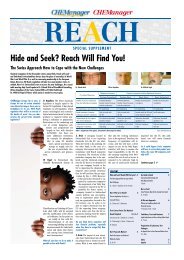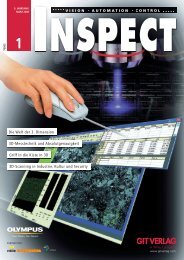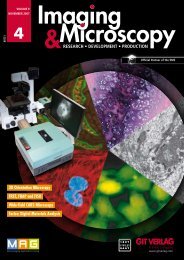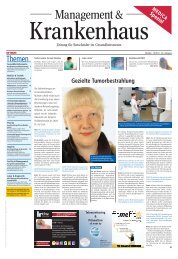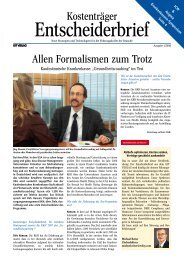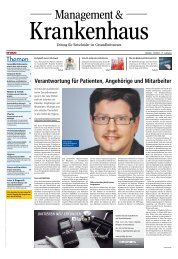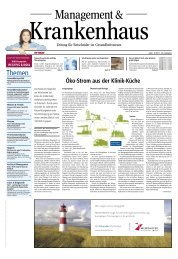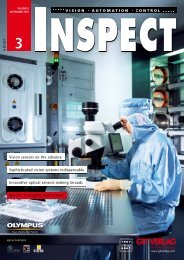Europe - GIT Verlag
Europe - GIT Verlag
Europe - GIT Verlag
Create successful ePaper yourself
Turn your PDF publications into a flip-book with our unique Google optimized e-Paper software.
Hospital Post <strong>Europe</strong> 04/08<br />
Kantonsspital St. Gallen (Cantonal<br />
Hospital of St. Gallen),<br />
Switzerland, encompasses the<br />
hospitals of St. Gallen, Ror-<br />
schach, and Flawil, and provides<br />
essential medical care<br />
for eastern Switzerland. For<br />
seven years, the hospital’s<br />
computer workstation infrastructure<br />
was based on the<br />
Windows 2000 operating system<br />
and Microsoft Office 2000<br />
desktop applications. The client<br />
software was increasingly<br />
reaching the limits of its performance,<br />
however, and becoming<br />
unstable in some areas.<br />
In order to retain high service<br />
levels at a reasonable cost,<br />
Kantonsspital St. Gallen chose<br />
to deploy the Windows Vista<br />
Enterprise operating system<br />
and the 2007 Microsoft Office<br />
system on 2,000 computers<br />
across the organization. This<br />
powerful new IT infrastructure<br />
will also support the hospital<br />
in introducing further valueadded<br />
services such as a clinical<br />
workstation portal for its<br />
employees that will be built<br />
using Microsoft Office Share-<br />
Point Server 2007.<br />
Situation<br />
“One company, three hospitals”: Under<br />
this motto, Kantonsspital St. Gallen – with<br />
approximately 3,000 employees – provides<br />
basic and specialist medical care for the<br />
population of east Switzerland, making it<br />
the sixth largest hospital in the country. In<br />
addition, Kantonsspital St. Gallen conducts<br />
research, performs educational activities,<br />
and offers accredited university-level training<br />
in its specialist disciplines.<br />
Until recently, the hospital’s 2,000 computer<br />
workstations ran desktop software<br />
based on the Windows 2000 operating system<br />
and Microsoft Office 2000 programs.<br />
These programs had been in use for seven<br />
years, and were repeatedly reaching the<br />
limits of their performance in day-to-day<br />
business.<br />
“The platform was beginning to become<br />
unstable. When we purchased new<br />
computers, we didn’t have the necessary<br />
drivers, and not all applications were<br />
supported,” explains Stephan Schläpfer,<br />
Project Manager at Kantonsspital St. Gallen.<br />
For example, employees had problems<br />
synchronizing their notebook computers<br />
via Microsoft ActiveSync technology, and<br />
mobile access to specialist applications<br />
using Windows 2000 was problematic. On<br />
top of this, Microsoft had ceased to provide<br />
mainstream support for the outdated<br />
operating system. “We urgently needed a<br />
powerful new basic IT infrastructure,” says<br />
Schläpfer.<br />
Kantonsspital St. Gallen also needed<br />
software that could support a new clinical<br />
workstation portal for its employees. The<br />
organization wanted to set up a dashboard<br />
page from which employees could access<br />
all required information and programs<br />
from their notebook computers. The portal<br />
would enable employees to locate information<br />
more quickly and improve their<br />
communication with one another. “Our<br />
aim is to turn IT into an easy-to-use everyday<br />
tool for users,” says Schläpfer. “At the<br />
same time, new tools would reduce administrative<br />
work for IT employees, increasing<br />
their productivity.”<br />
Solution<br />
The hospital chose to continue using Microsoft<br />
solutions to fulfill its software requirements.<br />
Employees work around the<br />
clock, using approximately 400 different<br />
specialist medical applications, and many<br />
of these already have interfaces to Microsoft<br />
Office applications. To support the<br />
software upgrade, Kantonsspital St. Gallen<br />
also upgraded its hardware, purchasing<br />
2,000 new computers: 1,750 desktop PCs<br />
and 250 notebooks.<br />
With Microsoft Office SharePoint Server<br />
2007 collaboration software, Microsoft was<br />
able to offer a solution for the planned portal<br />
that fully met the expectations of the IT<br />
managers. “The focus here is on employees<br />
and their needs. The company’s ‘people-ready’<br />
philosophy corresponds exactly<br />
to our planned clinical workstation portal,”<br />
explains Jürg Lindenmann, Head of IT at<br />
Kantonsspital St. Gallen.<br />
Project planning for the implementation<br />
of the Windows Vista operating system and<br />
2007 Microsoft Office was undertaken by<br />
department and external service providers.<br />
By participating in the Microsoft Technology<br />
Adoption Program (TAP), the project<br />
team was able to extensively test Windows<br />
Vista long before its market launch and<br />
ensure compatibility with special medical<br />
applications.<br />
In line with the people-ready philosophy,<br />
users were involved in the project<br />
right from the start. The project team<br />
mapped various user scenarios using the<br />
pre-release versions of Windows Vista and<br />
2007 Microsoft Office programs. In this<br />
way, users learned, for example, how meet-<br />
It & coMMunIcAtIons 21<br />
Upgraded Desktop Infrastructure<br />
New Operating System for Swiss Hospitals<br />
Essential medical care providers for east Switzerland: Kantonsspital St. Gallen (Cantonal Hospital of St.<br />
Gallen), Switzerland, combines the hospitals of St. Gallen, Rorschach, and Flawil.<br />
ings could be managed using the Microsoft<br />
Office Outlook 2007 messaging and collaboration<br />
client. “This approach went down<br />
very well, and we received a great deal of<br />
positive feedback from employees,” says<br />
Schläpfer.<br />
The project team also built a prototype<br />
of the clinical workstation portal using Office<br />
SharePoint Server 2007. “In rolling out<br />
Windows Vista, Microsoft Office 2007, and<br />
Microsoft Office SharePoint Server 2007,<br />
we are taking the first big step towards<br />
establishing a clinical workstation portal,<br />
which is to be implemented in phase<br />
three, by the end of 2009,” states Schläpfer.<br />
Thanks to the smooth interaction between<br />
Microsoft products, employees will have<br />
central access to office applications, specialist<br />
functions, appointments, and meeting<br />
management. Forms, archives, and<br />
the Intranet are also incorporated. All this<br />
will make it easier for employees to locate<br />
cross-clinical information.<br />
Preparations for the broad deployment<br />
continued up to March 2007. In September,<br />
the pilot rollout took place in the IT<br />
department and in three clinics: Cardiology,<br />
Infectious Diseases, and Ear, Nose<br />
and, Throat. Those involved in the project<br />
had one month to make any necessary<br />
modifications. The full rollout then began,<br />
building by building, in mid-November.<br />
“We were not able to carry out the rollout<br />
clinic by clinic, as many departments are<br />
spread across several locations,” Schläpfer<br />
explains. “During the rollout, we took<br />
measures to ensure that employees could<br />
access their data as usual, both on the old<br />
platform and on the new platform.” As<br />
planned, the team was able to conclude<br />
the rollout on all 2,000 computers by the<br />
end of February.<br />
In order to prepare employees for the<br />
new system, Kantonsspital St. Gallen began<br />
providing appropriate training seminars<br />
months before the actual rollout using<br />
a learning approach that combines face-toface<br />
instruction with flexible online training.<br />
“We provide one-and-a-half-hour seminars<br />
to teach employees the basics. They<br />
can then familiarize themselves with the<br />
new software at home and learn on their<br />
own,” Schläpfer continues.<br />
The Home Use Program included in the<br />
Microsoft Enterprise license agreement<br />
supports this option. The Home Use Program<br />
allows the hospital to issue Office<br />
2007 licenses for home use.<br />
Benefits – Modern and Stable<br />
Working Environment<br />
Various users, from doctors and physiotherapists<br />
to nursing staff, use the new system<br />
and can access their specialist applications<br />
just as before. Plus, users are finding that<br />
the system starts up quicker and it’s easier<br />
for them to find documents and files.<br />
“Windows Vista and the 2007 Microsoft<br />
Office system are being very well received<br />
by employees, both experienced and occasional<br />
PC users,” maintains Schläpfer.<br />
“They are all particularly impressed by the<br />
efficient Instant Search function in Windows<br />
Vista. Thanks to the online learning<br />
program, they can independently expand<br />
their knowledge and thus complete their<br />
work on the PC more efficiently. As for IT<br />
employees, the analysis tools in Windows<br />
Vista make their jobs easier.”<br />
Equipped For Future Projects<br />
The Microsoft solutions lay the foundation<br />
for future projects. “Windows Vista<br />
and the 2007 Microsoft Office system are<br />
not just new products for us, but also core<br />
elements of our long-term IT strategy,” emphasizes<br />
Lindenmann.<br />
www.microsoft.com<br />
www.kssg.ch<br />
New Head of Healthcare IT<br />
Agfa HealthCare, provider of IT-enabled<br />
clinical workflow and diagnostic imaging<br />
solutions, announces today that it has<br />
hired Dr. Volker Wetekam as its new Executive<br />
Vice President for its global HealthCare<br />
IT division. Dr. Wetekam will head up an<br />
operation of around 3,000 staff members<br />
and report directly to Christian Reinaudo,<br />
President of Agfa HealthCare. He will take<br />
up his new position mid-September.<br />
In his new role, company speakers<br />
explained, Dr. Wetekam – who comes from<br />
a top position with Siemens Healthcare<br />
– will define and implement the overall<br />
strategic positioning and roadmap for Agfa<br />
US: Huge Step Forward for<br />
Telemedicine<br />
At the end of June, the U.S. House of Representatives<br />
passed the bill H.R. 6331 by a<br />
landslide vote of 355-59. It contains provisions<br />
adding skilled nursing facilities, hospital-bases<br />
dialysis centres, and community<br />
mental health centres as originating sites<br />
for Medicare telehealth reimbursement.<br />
Shortly afterwards, Sens. Max Baucus<br />
and Charles Grassley, the Chairman and<br />
Ranking Republican on the Senate Finance<br />
Committee, announced that they had<br />
reached a compromise in their negotiations<br />
on the Medicare legislation. While a<br />
written copy of this compromise has not<br />
been released, American Telemedicine Association<br />
(ATA) has learned from sources<br />
HealthCare’s IT division, which manages<br />
both the company’s Imaging Informatics<br />
and its Enterprise IT business, covering<br />
solutions from Picture Archiving and Communications<br />
Systems (PACS) over Cardiovascular<br />
Information Systems (CVIS) to<br />
Hospital and Clinical Information Systems<br />
(HIS/CIS). He will be responsible for driving<br />
the division’s overall profitable growth.<br />
Dr. Wetekam will also become a permanent<br />
member of the HealthCare organization’s<br />
Executive Committee.<br />
www.agfa.com/healthcare<br />
on Capitol Hill that at least the skilled nursing<br />
facility provision and the hospital-based<br />
dialysis provision are in the compromise<br />
bill. ATA has indications that the community<br />
mental health centers provision is also<br />
in the compromise bill, but we have yet to<br />
confirm this.<br />
Inclusion of the telemedicine language<br />
in both the House and Senate versions of<br />
the Medicare bill makes its inclusion in the<br />
final legislation likely. “Passage of this legislation<br />
represents a huge step forward for<br />
telemedicine and a major victory for ATA,”<br />
the organization underlined.<br />
www.americantelemed.org



